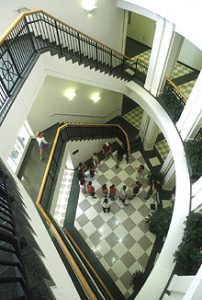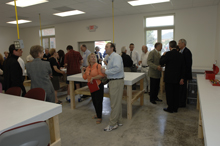Our Facilities
Founders Hall and Innovation Hall
Founders Hall
Founders Hall was made possible following a naming gift from Elon alumnus Furman Moseley ’56 and his wife, Susan Moseley, who are among the university’s most generous donors. The two-story, 20,000-square-foot building is designed to enable engineering students and faculty to transform bold ideas into prototypes. It includes multiple laboratories for design, advanced prototyping, astrophysics, prefabrication, mechatronics and virtual reality.
Among its unique attributes:
Innovation Hall
The three-story, 40,000-square-foot Innovation Hall is a hub for interdisciplinary studies, equipment and research in biomedicine, computer science, physics and robotics. The facility also features cutting-edge flexible classrooms for biophysics and physics, and laboratory space for core engineering courses, bioinstrumentation, environmental engineering research, biomedical and environmental labs.
Among its features:
Visit the Innovation Quad website
McMichael Science Center
Elon’s Engineering students have the advantage of first-rate computer and electronics labs in the $17.2 million Dalton L. McMichael Sr. Science Center, which opened in the fall of 1998 to house Elon’s expanding science program and support a significant undergraduate research program.
The 81,000-square-foot facility, which houses biology, chemistry, and environmental studies, features teaching labs, student research labs, computers loaded with the most current software, faculty offices, reading and conference rooms, and high-tech instrument packages.
These spacious classrooms and laboratories allow students to interact with faculty and other students and work on projects in the same area. In addition, data projectors allow faculty to use technology to enhance their presentations.
Hampl Engineering Workshop
The Hampl Engineering Workshop allows Engineering students to gain practical experience by applying principles taught in the classroom.
 Students are able to build prototypes of vehicles and structures and test basic engineering theories. The workshop contains basic tools for metal and wood works, such as hand drills, hacksaws and soldering equipment.
Students are able to build prototypes of vehicles and structures and test basic engineering theories. The workshop contains basic tools for metal and wood works, such as hand drills, hacksaws and soldering equipment.
The workshop, which is located adjacent to the Dalton L. McMichael Sr. Science Center, Founders Hall, and Innovation Hall, was made possible by a lead gift by Elon parents Bernhard and Carmen Hampl of New Canaan, Conn., and gifts from other parents.
To support Elon’s Engineering program, including the activities of the workshop and robotics lab, please contact the Office of University Advancement at 877-784-3566.